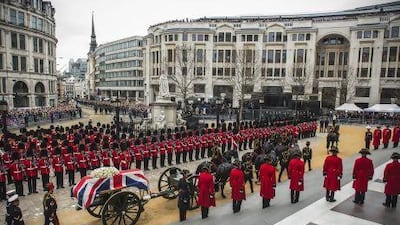LONDON // It was the Iron Lady's final public appearance and it was staged with military precision.
As the pallbearers brought Margaret Thatcher out of St Paul's Cathedral, they paused, briefly, amid applause from a solemn crowd gathered outside.
Then they carried away the flag-draped coffin containing the body of Britain's first and only female prime minister, and one of the country's most divisive political figures of modern times.
It was the last act of the biggest political funeral Britain has seen for half a century, and the first ceremonial funeral for 16 years, since Diana, the Princess of Wales, received full military honours in 1997.
Inside St Paul's, 2,300 dignitaries - among them Queen Elizabeth II, Prince Phillip, Thatcher family members including her son, Mark, and daughter, Carol, and former and present statesmen from around the world - heard David Cameron, the prime minister, and Thatcher's 19-year-old granddaughter, Amanda, read passages from the Bible.
Mr Cameron had earlier praised Thatcher as a "brave woman doing a difficult job".
He was joined at St Paul's by the deputy prime minister, Nick Clegg, the opposition Labour leader, Ed Miliband, as well as the former Labour prime ministers, Gordon Brown and Tony Blair.
Richard Chartres, the Bishop of London, delivered the main sermon, recalling both personal anecdotes about Thatcher as well as addressing the political legacy of Britain's longest continuously serving prime minister of the 20th century.
He singled out one of her more controversial statements, that there was "no such thing as society, only a collection of individuals", as having been widely misunderstood. The society she was rejecting, he said, was "some impersonal entity to which we are tempted to surrender our independence".
Among the foreign dignitaries in attendance were the Kuwaiti prime minister, Sheikh Jaber Al Mubarak Al Sabah, along with Sheikh Nasser Sabah Al Ahmed Al Sabah, the son of Kuwait's emir, Sabah IV Al Ahmad Al Jaber Al Sabah.
Malaysia's former prime minister Mahathir Mohamad was also present. Barack Obama sent a US presidential delegation led by George Shultz and James Baker III, both of whom served as secretary of state while Thatcher was in office.
F W de Klerk, the last president of apartheid-era South Africa, was invited as a private guest of the Thatcher family.
Her 11 years in office have come under heavy scrutiny since she died on April 8. Old wounds were reopened as Britons grieved or celebrated, divided between those who believed the Iron Lady - or Iron Man as Yasser Arafat once called her - had rescued Britain from years of steady decline, or destroyed the soul of a nation in favour of the wealthy few.
Those divisions, while not quite so obvious as they were last week when news of her death inspired parties across the country, were nevertheless evident among the thousands who thronged the streets along the route of the horse-drawn gun carriage that carried Thatcher's coffin.
Some turned their backs in protest as the procession approached. Others watched and then applauded as the funeral procession left the Church of St Clement Danes in central London, for St Paul's.
Jogin George, 68, a retired greengrocer from Kent, said the former prime minster deserved respect.
"She did many good things for this country," he said. Without her reforms, he added, he would not have left a job in nursing to open his own business. "I did well because of her."
Teresa Salters, 68, a retired accountant from London, shared that view.
"She made it possible for people who worked hard to be successful," said Mrs Salters, clearly moved by the occasion.
Those who came to protest at the funeral were being "disrespectful", she said, adding: "She deserves this. She took back the Falklands. She was a great prime minister. She stood by her principles and never backed down."
Her companion, Tracy Lester, disagreed.
"As a woman, I admired her for never allowing herself to be bullied," the 42-year-old teacher said. Those celebrating her death had also shown a "lack of taste", she said, but the funeral costs should not have been borne by taxpayers.
That sentiment was perhaps the final controversy Thatcher will provoke, but it is one that has been rumbling since long before her death.
While falling just short of a full state funeral - such as the one accorded Winston Churchill in 1965 - her ceremonial burial was expected to cost £10 million (Dh55.9m), a cost that had long been forestalled by critics who suggested that - in the spirit of her politics - her funeral should have been privatised.
Among the people lining the route of the procession, some made that point quite vocally.
One carried a placard stating simply: "I am not happy to pay for Thatcher's funeral".
twitter: For breaking news from the Gulf, the Middle East and around the globe follow The National World. Follow us

